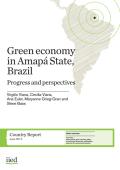
This report discusses the opportunities presented by the Amapá State government’s intention to make the transition to a green economy. It explores initial progress in green policy and activity, and associated dynamics in the political economy, and lays out a broad but feasible set of sectoral and cross-sectoral policy options...
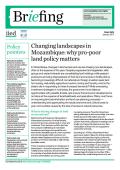
In Mozambique, changes in land access and use are shaping new landscapes, often at the expense of the poor. Despite progressive land legislation, elite groups and vested interests are consolidating land holdings while peasant producers are being dispossessed of their land and access to fertile plots is becoming increasingly difficult...
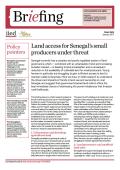
Senegal currently has a complex and poorly regulated system of land governance, which — combined with an urbanisation trend and increasing outsider interest — is leading to land privatisation and a consequent reduction in the availability of cultivable land for small producers. Young farmers, in particular, are struggling to gain...
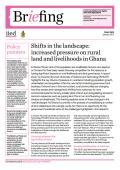
In Ghana 70 per cent of the population are smallholder farmers who depend on the land for their basic needs. Growing competition for this resource is having significant impacts on rural livelihoods and land governance. A recent study by Kwame Nkrumah University of Science and Technology (KNUST) highlights the key...
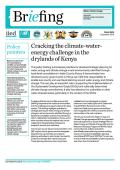
This policy briefing summarises priorities for devolved strategic planning for water, energy and climate change in arid environments, identified through local-level consultations in Isiolo County, Kenya. It demonstrates how devolved county governments in Kenya can fulfil their responsibility to enable sub-county and ward level planning around water, energy and climate...
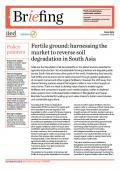
Soils are the foundation of all terrestrial life on the planet and are essential for agricultural production. Yet unsustainable farming practices are degrading soils across South Asia and many other parts of the world, threatening food security.
Soil fertility and structure can be vastly improved through greater applications of compost...
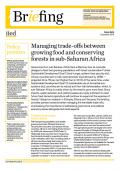
Governments in sub-Saharan Africa face a dilemma: how to reconcile pledges to feed fast-growing populations with forest conservation? Under Sustainable Development Goal 2 (end hunger, achieve food security etc), African countries aim to fully meet domestic food demand by 2030 — projected to be 70 percent higher than in 2010...
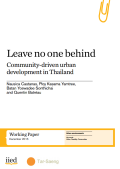
This paper examines community participation in housing projects for low-income communities in Thailand and how they have sought to ‘leave no one behind’. Baan Mankong, the government slum upgrading programme, is unique in how it has institutionalised participation. Housing projects funded by international funders, community savings or small government subsidies...

Access to modern energy is vital for sustainable development. In rural areas, decentralized energy solutions may play a significant role in reducing poverty, supporting community institutions and facilitating the generation of basic services such as communication, water access, education and health services. However, the majority of dwellers in off-grid communities...

Sub-Saharan Africa faces the worst land degradation in the world. This jeopardizes its efforts to reduce poverty as most rural livelihoods depend heavily on natural resources. Although a number of policies and strategies have been designed to reduce poverty and achieve food security, more has to be done. This study...
